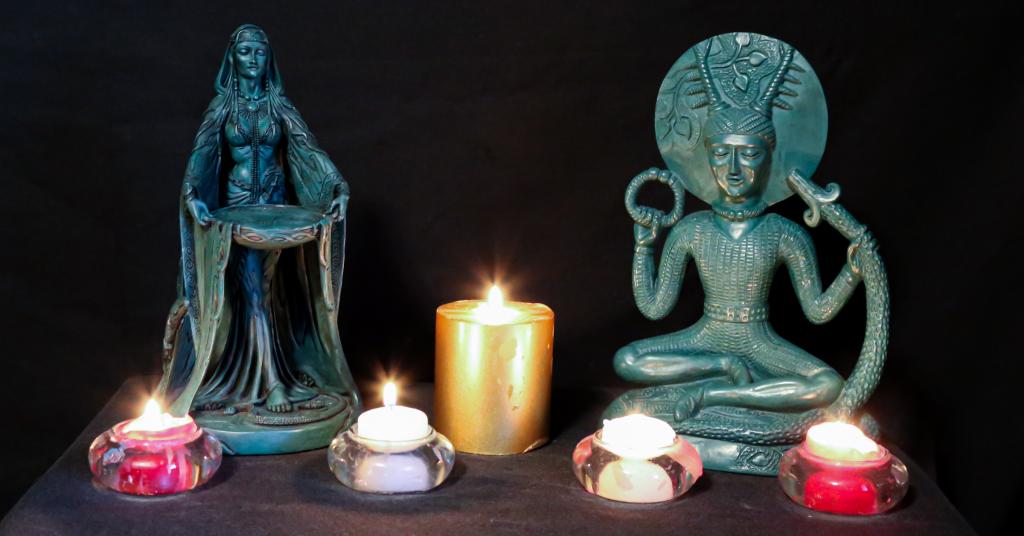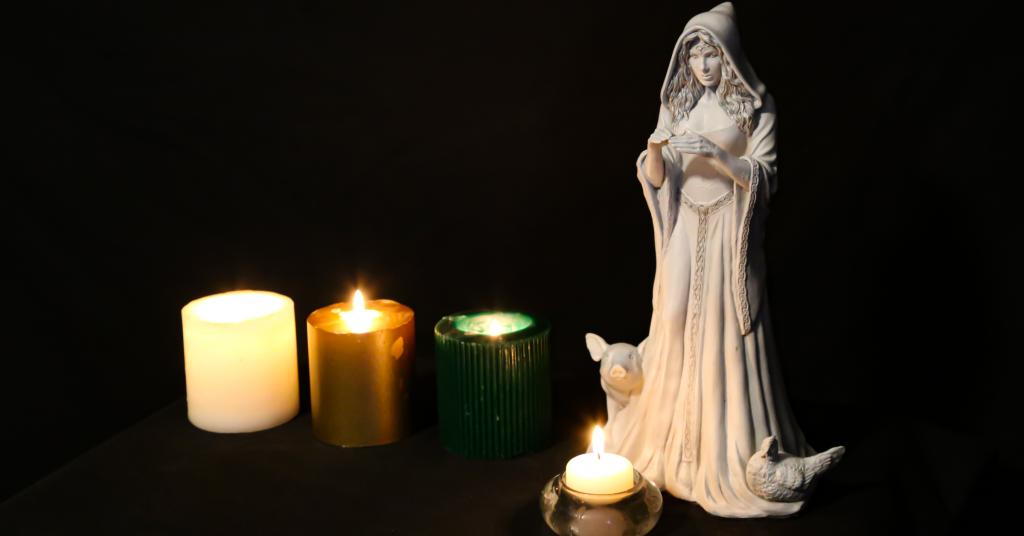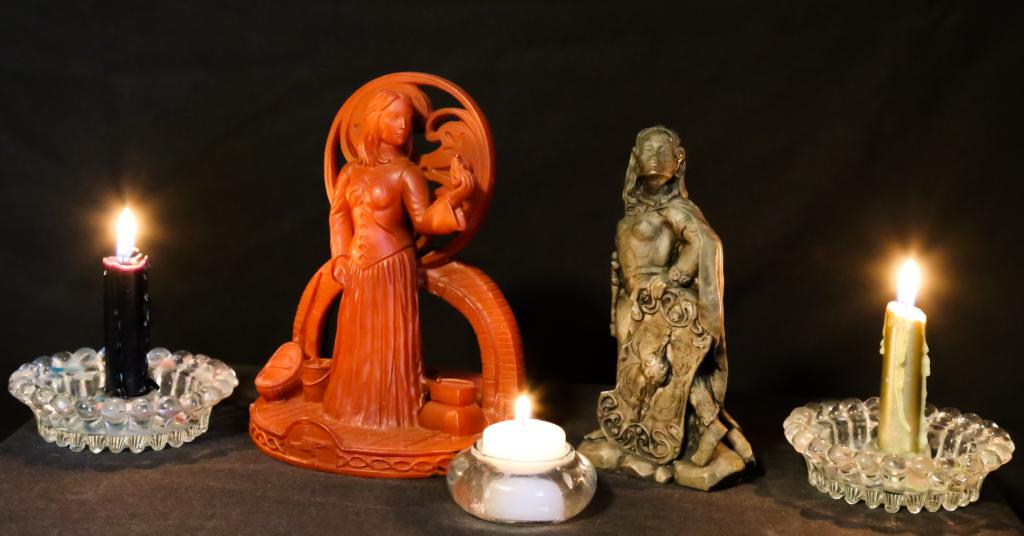Today we have three questions about working with multiple Gods. Or if you prefer, worshipping, working for, serving, honoring – pick the term that matches what you do.
The Goddess and the God
Being fairly new to the world of polytheism I’ve wondered about the references to “the God and Goddess” that I’ve seen. Are those commonly viewed as deities distinct from the personified Gods that we worship, or are they meant to encompass all the Gods and Goddesses?
“The Goddess and the God” is not a polytheist term. It is a Pagan term, and it can mean several things.
In some groups – especially the traditional forms of Wicca – “the Goddess and the God” is a placeholder for the patron deities of the tradition. Their names are oathbound – I’m not a Wiccan, so I don’t know what the reasons are. “The Goddess and the God” is used in public events and in “outer court” rituals – the individual names are revealed after initiation and are only used by initiates.
In other traditions, “the Goddess and the God” is an expression of duotheism – the idea that there is one Goddess and all individual Goddesses are aspects of Her, and that there is one God and all individual Gods are aspects of Him. This is a form of soft polytheism, which isn’t really polytheism so much as it’s panentheism.
I used the term in the early years of my practice, as I was trying to move from a lifetime of understanding “God” as the one (supposedly) almighty being of Christianity. Once I began to experience the many Gods as individuals, I gradually stopped using it.
I don’t use the term anymore, but I try to remember that other people are in different places on their journeys.

Introducing yourself to a deity
When you’re building a practice, how do you recommend introducing yourself to a deity you want to acknowledge and/or work with in the future?
Begin with some basic research. Who is this deity? Where were They originally worshipped? Who were Their people and how did they interact with Them? What are Their stories?
Who are Their people today? There are numerous devotional anthologies and other works by contemporary priests and devotees. There’s not one for every deity, but there are many. If there’s one for the God you’re interested in, read it and see how others are relating to Them here and now.
After a bit of study you will probably feel like you’ve learned a lot. You will also probably feel like you haven’t learned enough. But there is no “required minimum knowledge” and the learning process will go on for as long as you are in relationship with Them. The sooner that relationship begins, the sooner your first-hand learning process can begin. Don’t wait too long to start.

When you’re ready, introduce yourself with prayers and offerings. This can be as simple as “hi, I’m John – here’s some good wine I’d like to share with you.” Some Gods have traditional offerings, but in my experience most of Them are quite happy to drink what you’re drinking. If all you have is clean water, then offer clean water. If you can offer more, then offer more. You need not be extravagant – just don’t offer the cheap stuff and keep the good stuff for yourself.
Then listen. This is the most important part of the whole process, and one that too many people either minimize or outright ignore. Sit in silent meditation for as long as feels right. Listen with all your senses. Don’t expect to hear a response with your physical ears (though that does happen on rare occasion). Instead, listen for thoughts that come from nowhere, especially those that tell you things you had no way of knowing.
This is why any good spiritual practice begins with “know yourself.” If you know your own thoughts, then it’s much easier to recognize the thoughts that aren’t yours.
You may hear nothing. That doesn’t mean you did it wrong. That means the Gods are autonomous beings who respond when and how They see fit, not just because we call Them.
If you hear nothing, try again in a day or two – persistence is a virtue. If you hear nothing after multiple attempts, then perhaps this isn’t the deity for you. Or perhaps this isn’t the deity for you at this moment. There are many Gods – listen for the one(s) that call to you.
Or perhaps your calling is simply to honor this deity and nothing more. It is always good to honor the Gods, whether They respond or not.
Blessings to you and to all who pursue the Gods.
Working with multiple deities
How do you equally divide attention between deities? I’ve been in a relationship with just one God for many years. Then another God came along (I’ve actually realized He’s been part of my life for a long time, I just didn’t notice) and now I sometimes feel it’s difficult for me to properly pay attention to the other God.
This question is both very simple and very hard. The answer is that you don’t divide your attention. You give the first deity everything They ask for. And you give the second deity everything They ask for. There is no “or” – everything is “and”.
The good news is that for the most part, our Gods are not jealous Gods. As long as They get what They want, they pretty much don’t care who else we worship and work with.
There are exceptions. Occasionally someone will be told “you’re mine and I’ve got so much for you to do you’re not going to have time for other Gods.”
Most human-divine relationships begin when a God calls a person to Their service. Other times it begins when a human pursues a God, as discussed in the section above. But sometimes the Gods take what They want, and sometimes what They want is you.
This is rare, but it does happen.

As for me, I am oathed to three deities. Cernunnos and the Morrigan keep me busy, but not too busy, at least not most of the time. Danu makes few demands beyond routine worship. I have formal-but-not-oathed relationships with four others – that mostly involves work on an as-needed basis. Sometimes the total load gets to be a bit much, but I’ve always managed to make it work.
If you feel like you’re having trouble satisfying two deities, my suggestion is to ask each one (separately) exactly what They want. Clarify expectations. Negotiate what you can and can’t do. Then make commitments… and keep them.
As with our human relationships, our divine relationships work best when communication is clear and frequent.













